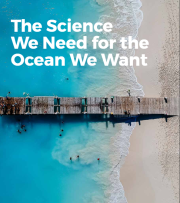Changing climate, threats to marine biodiversity and seafood security and the health of ocean ecosystems were among the top priorities for action agreed to at the recent 10th Session of the (International Oceanographic Commission) for the Western Pacific (WESTPAC).
Nearly 100 delegates and representatives from 15 member states in the region and five partner organizations/programmes gathered for the session in Phuket, Thailand from 12-15 May.
Representatives from relevant government agencies and marine scientific communities agreed on a US$8 million action plan aimed at advancing international cooperation on marine science, observation and services, enhancing institutional capacities and improving interfaces between the scientific and policy levels to addresses critical ocean-related challenges in the region.
One such initiative is the planned development of a regional network to research and monitor the ecological impacts of ocean acidification, the development of the Indo-Pacific Ocean Observations and Services Network (IPON), upwelling (oceanic process whereby nutrient-rich deep in the ocean rises up and provides a major supports for ocean life) studies through data integration, and the study of endangered marine mammals in tropical areas.
An Intersessional Task Force was also formed to conduct a feasibility study on the possibility of conducting a second cooperative study on Kuroshio, a current flowing from the tropical northwest northward via the East China Sea towards the North Western Pacific, which has a great impact on regional climate, ocean ecosystems and fisheries. The first Cooperative Study on Kuroshio and adjacent regions (CSK-1) conducted under the auspices of the IOC in 1965 and eventually led to the formation of WESTPAC in 1989.
Another open-ended Intersessional Task Force was also established towards the establishment of a Scientific Steering Committee for the Indo-Pacific Ocean Observations and Services Network (SC-IPON). The task force is expected to pave the way for the establishment the committee, which will take the lead in guiding the development of IPON.
Member states also vowed to strengthen their efforts to develop a regional network of IOC training and research centres on marine science. The government of China and its First Institute of Oceanography, State Oceanic Administration, renewed its commitment to continuing to hose the Regional Training and Research Center on Ocean Dynamics and Climate (RTRC-ODC). The RTRC-ODC will continue to provide trainings to young researchers within and outside the region on ocean dynamics, air-sea interactions and ocean models.
All member states welcomed Sri Lanka and Bangladesh as the 21st and 22nd member states of WESTPAC, and elected Dr Somkiat Khokiattiwong from Thailand, Dr Youn-Ho Lee from the Republic of Korea, and Dr Vo Si Tuan from Vietnam as WESTPAC Chair, and Vice-Chairs respectively.




